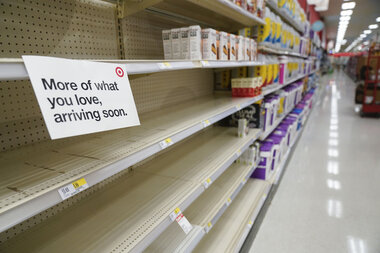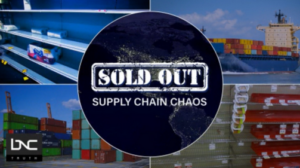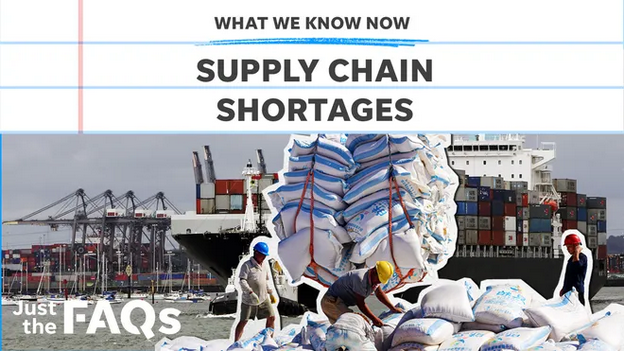As wholesale salvage food suppliers, we get a frontline view of the grocery supply chain since we work with food manufacturers, packers, co-packers, suppliers, distributors, retailers, food banks, discount food stores, and government institutions. In other words, we have a daily pulse on market conditions.
Our unique position in this niche food industry, a category in which Marvell Foods has earned a national reputation as a leader, allows us to observe the food supply chain in both the best and worst of times.
Stating the obvious; Since Covid, everything has changed. We’ve previously covered various aspects of the impacts on the food/supply chain in earlier blog postings. But, things have not gotten much better. Now that there’s a war, even though it’s in Europe, the nation’s food supply chain remains bleak. In actuality, things may get worse before they get better.
Here’s a quick recap on how the grocery supply chain system functions typically to understand better the dire circumstances in which many people and companies in the food industry currently find themselves.
A SIMPLE THREE-STEP PROCESS – IN THE OLD DAYS, NO LONGER
It’s essentially a three-step process from food processor to food purchaser. The processor, also known as the manufacturer, buys raw ingredients and turns them into products in step one. Step two, these products are then sent to a distribution center, where they are organized and transported to retail locations. Step three, these products arrive at the grocery stores for direct sale to consumers. Step three can be modified to the extent that instead of food shipping to stores – retail, wholesale, etc., food products also end up, as part of food service, in movie theaters, restaurants, concert venues, cruise ships, etc.

The above steps or channels are pretty clear cut. However, here’s where it gets tricky and troubling. When Covid struck, businesses shut down, virtually all companies across the country and the globe. This meant either few or no employees to work in the processing plants. So, few or no employees means less product output. That’s just at the “plant” and or “factory.” Then there was the issue of trucking and truck drivers. Same scenario here: Fewer truckers (because of Covid) meant fewer deliveries. The price/cost of deliveries went up because of a scarcity of drivers and increased fuel costs.
Given the above scenarios, since there is essentially less of everything, the economic theories of price/demand/supply are powerfully in play and display. To compound matters, we are now looking at inflation on top of everything else, which means the available food products are more expensive – depending upon the products, we’ve seen 5% to 20% increases, and often higher, on items like bacon, meat, cheese, eggs, poultry.

Since there are fewer goods (high cost) and high demand (not enough products) as the nation’s leading food broker, salvage food broker, and Food Closeout Buyer, Marvell foods is uniquely positioned to offer its customers close-coded and short-dated food. The demand for short-dated and close-coded food from all sectors has risen exponentially given the recent high cost, high demand, and short supply of food products. Since these short-coded and “best use by dates” are fast approaching, Marvell Foods can secure these goods at highly discounted prices for its national customer base.
How Overstock Grocery Store Buyers Benefit the Supply Chain
Wholesale salvage food suppliers might not be the first buyers that come to mind when people think of the grocery supply chain. Still, they serve an essential role in maintaining a constant flow of products to the marketplace and customers seeking to fight high food costs triggered by Covid, inflation, and all the other conditions covered in this post – (and other blog posts.)
Surplus grocery buyers create efficiencies in the supply chain, often purchasing products directly from food manufacturers and bypassing mid-level distribution channels. When the supply chain is operating as it should, wholesale grocers get products into consumers’ hands faster and provide solutions for selling excess inventory, surplus food, salvage food, out-of-date food, and other hard-to-offload products. And, when normal distribution channels stop working as they should (which they have), then a company like Marvell Foods can help bridge the gap between manufacturer and consumer and ensure that everyday buyers get the food products they need at a price they can afford.
Connect the Supply Chain Dots with Marvell Foods
At Marvell Foods, we put our experience as wholesale salvage food suppliers to work to relieve the burden of distribution inefficiencies in the grocery supply chain and make sure that people have access to the food they want to buy. We also work directly with wholesale grocers and other retailers to source the products they need—especially when other channels have failed them.
The supply chain can be unpredictable. Even in the best of conditions, it’s good to have as many options as possible to keep shelves stocked and customers/consumers happy. Marvell Foods, a family-owned, multi-generational company, has more than three decades of experience facilitating the distribution of goods to commercial and consumer sectors and our charitable partners.
If you’re searching “wholesale grocery store suppliers near me,” you’ve come to the right place. Get in touch with our team to learn more about our salvage and surplus grocery services, and implement intelligent solutions for overcoming unanticipated issues in the grocery supply chain.

